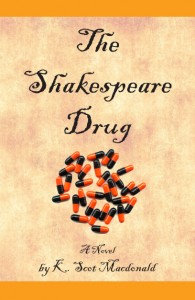 Some suggested questions to spark discussion about The Shakespeare Drug in a reader’s group:
Some suggested questions to spark discussion about The Shakespeare Drug in a reader’s group:
- At the start of The Shakespeare Drug Tom Morris undergoes a risky neurosurgical operation for the chance of restoring his sight so he can play golf. Did he make the right choice? Was it only right because it turned out well? If he had died, did Julie do the right thing to perform the operation? Why or why not?
- Do successful people, such as Dr. Julie Stein in The Shakespeare Drug and basketball legend Michael Jordan, who tried to play professional baseball, often seek success in other areas of endeavor? Why? What traits drive them to often abandon success in one area or at least attempt to replicate it in another field?
- Julie’s hospital, Mount Herman, stops her drug trial after the death of an Alzheimer’s patient. Should they have done so? Should Alzheimer’s patients and others with incurable diseases have more freedom to take what drugs they want than healthy or younger individuals?
- Dr. Baxter, Julie’s boss, fires her for taking the drugs in her trial in her attempt to become a novelist. Do you think he would have taken drugs that put his life at risk if it meant he could win the Nobel Prize in Medicine?
- Would it be right to risk your health to create a great work of art? To risk a child’s life?
- Julie Stein and her son, Pete, debate the relative worth of risking their lives for art or sports. How does our society value sports? Art and literature? How are such values shown in terms of money, prestige and media attention?
- What are some of the mixed signals society sends young people about the relative importance of sports?
- Julie faces both good and bad aspects of her dream of becoming a novelist. What affect do dreams have on an individual’s life? For the good? For the bad?
- Julie is Jewish. Do you think her religion and background colored her perception and belief about the value of Pete’s dream to play in the NFL? Would her views have been different if she had been Catholic and attended Notre Dame? Agnostic?
- How might Pete’s father, an ex-football player, have handled Pete’s use of steroids different than Julie did?
- Julie falls in love with Alan, an Army officer. Julie often loses patients and Alan has lost soldiers in battle. What is the difference, if any, between death in battle and death in a hospital bed? Does it matter is someone dies for a reason or a cause?
- Pete gives up on his dream of playing in the NFL, yet remained in football the rest of his life. Do most people who give up on a dream abandon the area of their dream entirely? Why or why not?
- Julie and Pete both “cheat” in different ways to succeed by taking drugs to improve their performance. Both stop taking their respective drugs and then fail. In the end, Julie starts again and succeeds, albeit posthumously. Do individuals need to “cheat” to succeed? In what ways? In which fields—sports, art, science, business?
- Should Pete have forgiven his mom for risking her life to write a great novel? Earlier in her life or only later when she was older?
- Each chapter in The Shakespeare Drug begins with an epigraph (quotation). Can you think of a quotation that seemed particularly appropriate for a chapter? Did the epigraphs add to the story? Detract from it?
